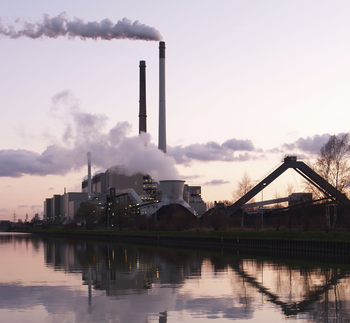 |
| Coal power plant, Germany (Wikipedia) |
In a surprising announcement last night Clive Palmer promised to abolish Australia’s current carbon price, and block the coalition’s Direct Action policy.
But Palmer has said he will vote to retain the Clean Energy Finance Corporation, the Climate Change Authority, and the Renewable Energy Target in its current form - all currently on the coalition’s chopping block.
You can listen to Professor Michael Raupach assess Palmer’s climate policies below.
But first, this is what they mean for Australia’s climate action:
What’s Out …
Carbon pricing
Palmer will vote to abolish the current fixed price on carbon. Under Australia’s carbon pricing scheme, polluters (including industry, electricity and waste) are charged per tonne of CO2 emitted.
Currently set at AU$24.15 per tonne of CO2, polluters are not charged for the majority of their emissions. The scheme is scheduled to move to an emissions trading scheme, with a floating price, from July next year.
Direct Action
Palmer has vowed to block the coalition’s Direct Action scheme. Direct Action is the coalition’s voluntary scheme to reduce carbon emissions.
Under the scheme, polluters makes bid into an Emission Reduction Fund (currently AU$2.55 billion until 2018) on emissions reductions - such as improving farming techniques to store carbon. The government will then distribute funding to the “lowest cost” method of reducing emissions.
Many commentators have argued the scheme is flawed because it will not provide enough funding, will not set a baseline on emissions, and will not punish polluters for exceeding baselines.
… and What’s In
Renewable Energy Target
Palmer will not support any change to the RET before 2016. The Renewable Energy Target, currently under review, rules that 20% of Australia’s electricity supply must come from renewable sources by 2020. According to recent modelling, the scheme will increase household power bills until 2020, with savings forecast after.
Clean Energy Finance Corporation
Palmer will vote against abolishing the CEFC. The CEFC is a “green bank", with AU$10 billion available to finance "clean energy” - half is reserved for renewable energy. The corporation has already attracted more than AU$1 billion in external funding.
Climate Change Authority
Palmer will vote against abolishing the Climate Change Authority. The authority reviews and advises on Australia’s climate policies. This year it recommended Australia increase its emissions reduction target from 5% below 2000 levels by 2020 to 19% below 2000 levels by 2020.
Emissions trading scheme?
Palmer said he will introduce an amendment for a emissions trading scheme, with no price until it is linked with key trading partners - China, Japan, Korea, the US and the EU.
In an interview with The Conversation, Professor Michael Raupach, Director of the Australian National University Climate Change Institute said Palmer’s policy is “step back, and a couple of small steps forward”.
This article was originally published on The Conversation. Read the original article.
No comments:
Post a Comment